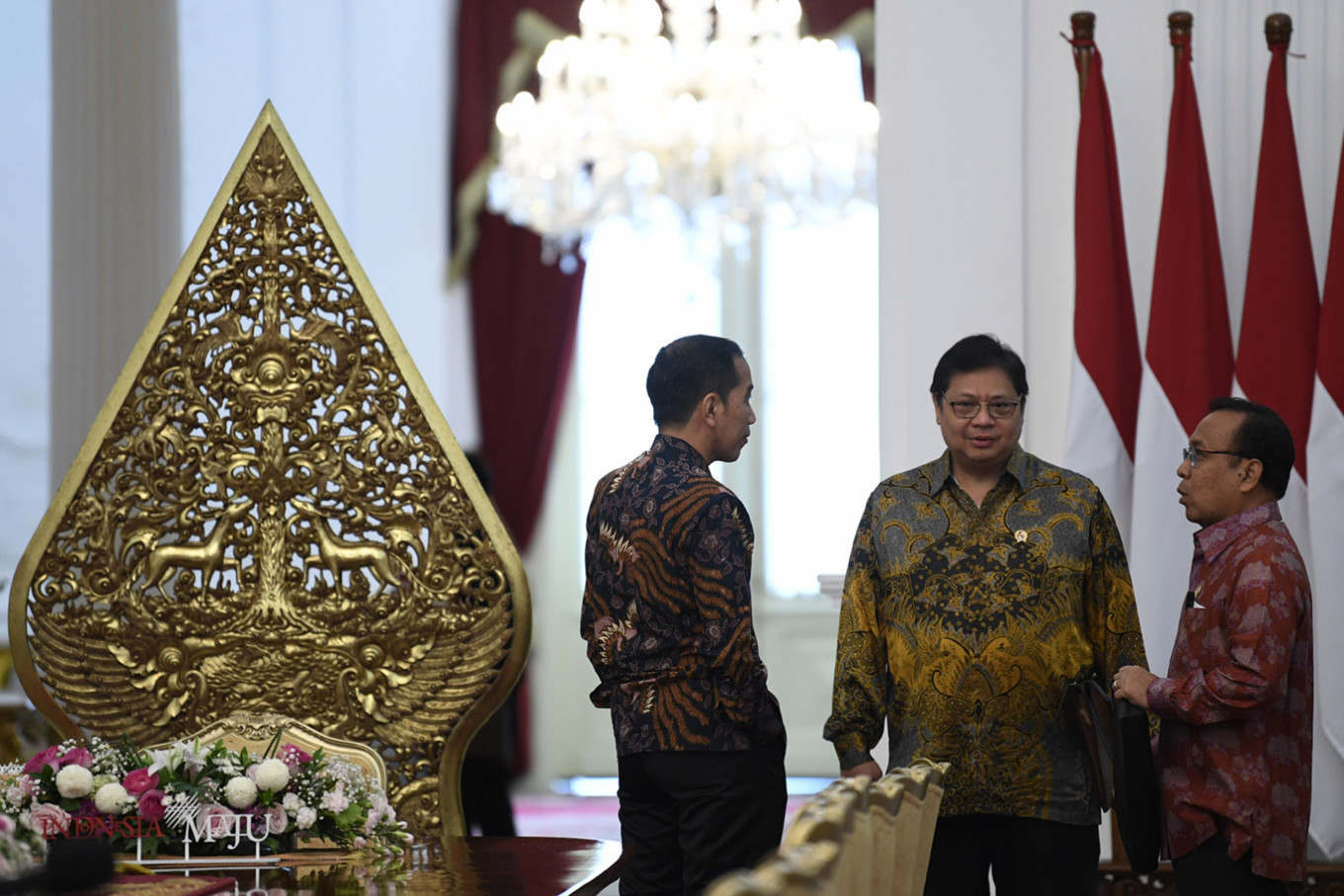Indonesia may disband more agencies to slash red tape

President Joko “Jokowi” Widodo (left) speaks to State Secretary Pratikno (right) and Coordinating Economic Affairs Minister Airlangga Hartarto on the sidelines of a diplomatic meeting at Merdeka Palace on Jan. 10. (Antara/Puspa Perwitasari)
JAKARTA — President Joko “Jokowi” Widodo disbanded 18 state agencies on Monday, but this may only be the beginning of a renewed drive to trim down the Indonesian bureaucracy, officials have hinted.
Jokowi has signed Presidential Regulation (Perpres) No. 82/2020 on the COVID-19 response and the National Economic Recovery Committee, announced Coordinating Economic Minister Airlangga Hartarto at the State Palace on Monday.
The regulation disbanded 18 state agencies in a bid to free up more resources so that the government could respond more effectively to the COVID-19 crisis, Cabinet Secretary Pramono Anung said on Tuesday.
“We have come to realize that the handling of COVID-19 […] and the handling of the economy are inseparable. We’ve learned from the many countries that have put too much emphasis on health that the economic issues turn into another kind of [problem],” he explained.
The regulation stipulates that the mandates of affected state agencies would be returned to the relevant ministries or taken over by the newly formed National Economic Recovery (PEN) task force or the national COVID-19 task force, both of which answer to Airlangga, who is the chairman of the national committee and its policymaking subcommittee.
The Mangrove Management National Coordination Team, for example, was dissolved and its authorities were distributed to the Environment and Forestry Ministry and the Maritime Affairs and Fisheries Ministry. The Ease of Doing Business task force, which was established in 2017 under Jokowi, will have its duties taken over by the PEN task force.
Absent from the list of dissolved agencies are three state bodies that Presidential Chief of Staff Moeldoko previously said were being considered for disbandment, namely the Peatland Restoration Agency (BRG), the National Sports Standardization and Accreditation Agency (BSANK) and the National Commission for the Elderly.
When asked why some agencies previously named were not dissolved, Donny Gahral Adian, the lead expert at the Office of the Presidential Chief of Staff (KSP), hinted that there might be more to come.
“So far, there are 18 agencies that were disbanded with the Perpres. But there are other agencies whose tasks can be integrated with the relevant ministries that are still under review,” he told the Post on Tuesday.
Jokowi floated the idea of disbanding state agencies that were deemed ineffective or that had overlapping mandates early last week. He said he would like to see a leaner bureaucracy and that the measure would help the government rein in its spending.
Since then, a handful of state officials have pointed out a number of state agencies for review.
Administrative and Bureaucratic Reforms Minister Tjahjo Kumolo told kompas.com on Monday that the agencies disbanded in the new presidential regulation were not listed among the state bodies that his ministry submitted to the State Secretariat for consideration.
“[The agencies] that the Administrative and Bureaucratic Reforms Ministry recommended to be disbanded were not included in the Perpres,” Tjahjo said on Monday. He did not respond to queries for further details on Tuesday.
Following Airlangga’s announcement on Monday, Tjahjo told the Post that his ministry had submitted a shortlist of state agencies to be disbanded. This list was made after evaluating state agencies’ performance and scrutinizing potentially overlapping authority.
“The State Secretariat will deliberate further [whether the agencies should be disbanded]. Hopefully a decision will be reached in July,” Tjahjo said.
The state agencies dissolved on Monday and those that may still be under consideration were established both by presidential or government regulations and by laws. Tjahjo has said, however, that state bodies with a mandate established by law can only be disbanded after the approval of the House of Representatives through an amendment to the law.
Jokowi is no stranger to disbanding non-performing government agencies and advocating for a leaner and more agile bureaucracy.
Shortly after his inauguration in 2014, Jokowi disbanded 10 agencies through Perpres No. 176/2014. He also dissolved an agency that was tasked with reducing greenhouse gas emissions and deforestation as well as the National Climate Change Council and returned their respective mandates to the Environment and Forestry Ministry in 2015.
Jokowi went on to disband another 10 agencies in 2016, and another agency, the Sidoarjo Mudflow Mitigation Agency, in 2017.
But critics have decried what they say is the President’s propensity to turn a blind eye to overlapping authority in the agencies that surround him.
Zaenur Rohman, a researcher at Gadjah Mada University’s Center for Anti-Corruption Studies (Pukat UGM), has noted that the State Secretariat, the Cabinet Secretariat and the KSP all have similar tasks.
“In addition to reviewing other institutions, the State Palace itself needs to be reviewed, regarding how its agencies carry out their duties,” Zaenur said.
While he expressed appreciation for efforts to control state spending, the researcher said the government would do well to review a number of its spending decisions. Some Rp 4.1 trillion (US$ 276.78 million) has been earmarked for state travel expenditures in a purported effort to support the economies of tourist destinations throughout the country.
“That budget could be channeled directly to the businesses in the form of a stimulus or to sections of the public that were hit hardest by the [sluggish] economy resulting from COVID-19,” he said.
For more news about the novel coronavirus click here.
What you need to know about Coronavirus.
For more information on COVID-19, call the DOH Hotline: (02) 86517800 local 1149/1150.
The Inquirer Foundation supports our healthcare frontliners and is still accepting cash donations to be deposited at Banco de Oro (BDO) current account #007960018860 or donate through PayMaya using this link.